Bendy like a tent pole
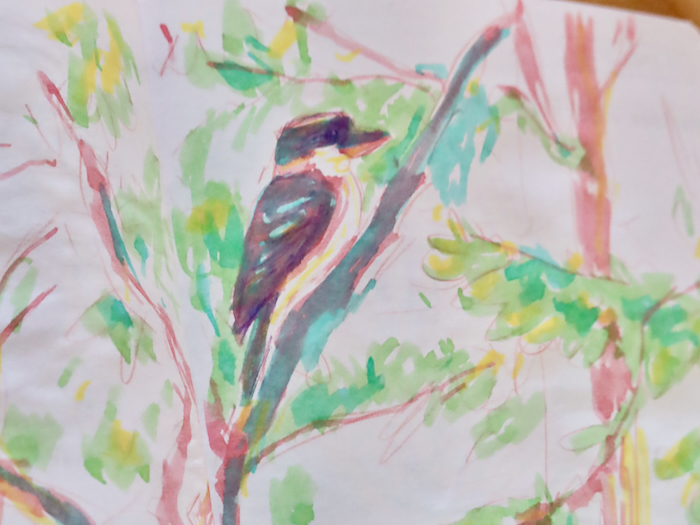
Hey there,
Last week I mentioned creating a camping packing list and trying to accept that there are things I can't control. Well, two big things that really resist control and can throw a spanner in the works for newbie campers are bad weather and sick kids, and both of those things happened for us resulting in our trip ending a couple nights early. Would I camp again? Yes, but probably not in the rain with two young kids and a dog until we have a little more experience.
This truncated trip definitely made me aware of comfortable, ordered and routine-based our life at home is. I was very much out of my comfort zone with the chaos of staying in a tent, our things everywhere, rain and dirt and mud everywhere, only thin tent fabric between us and our neighbouring campers, the kids precise bedtime routine pointless to attempt. But actually, it was fine. Everyone got (some) sleep, we played in playgrounds between the rain, we rugged up and had meals in the outdoor part of the brewery (where our dog could be with us), we made s'mores and pancakes on a kitchen stove inside the tent to keep out of the rain. It wasn't exactly what I had hoped, but it was definitely a memorable experience with plenty of good bits. Then Mr 2 got sick and dealing with that in a slightly leaky tent is a bit too much discomfort for all of us, so we packed up and drove home to our house which suddenly felt so much bigger, warmer, more solid and lovely than it did when we left it a few days ago.
Whilst I kind of wish I'd followed my instinct to cancel or delay our trip for better weather, I think that having periods of contrast like this where I am pushed out of my comfort zone are useful. Not just to better appreciate my privilege and possessions, but to force myself to let go a little and be more open to spontaneous experiences, and less anxious about things not going to plan. I've started to think about whether I sometimes let control get in the way of joy or connection.
Mr 4 was not at all keen on sleeping in tents. After a lot of convincing he eventually laid down in his sleeping bag next to me. "Did you know," he whispered, big eyes looking at me and then the tent shaking around us in the wind and rain, "when things wobble like this, it means they're about to fall down." I told him: "Some things, yes. But some things, like this tent, are made from stuff that is strong, but also bendy. So they might wobble or flex but they don't break or fall over. And when the wind stops blowing they stand straight again." That seemed to satisfy him because he curled up next to me and drifted off to sleep.
I've been creating
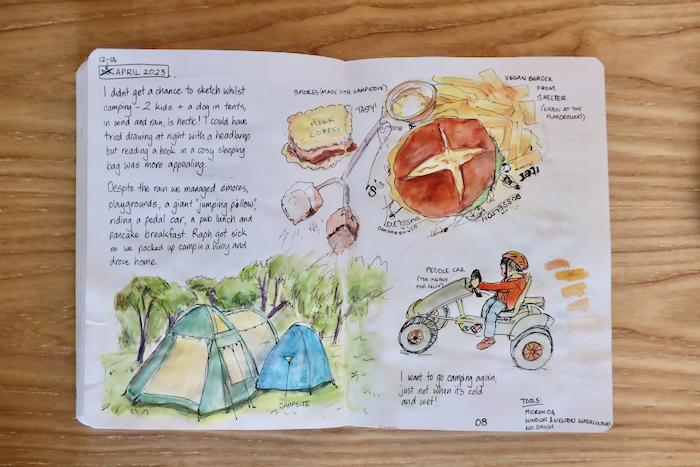
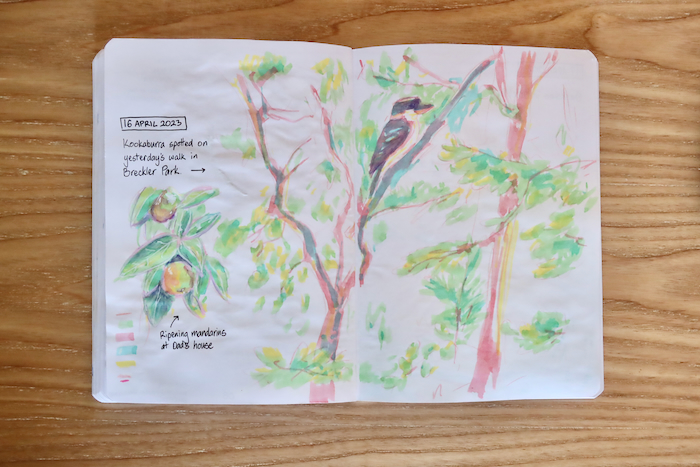
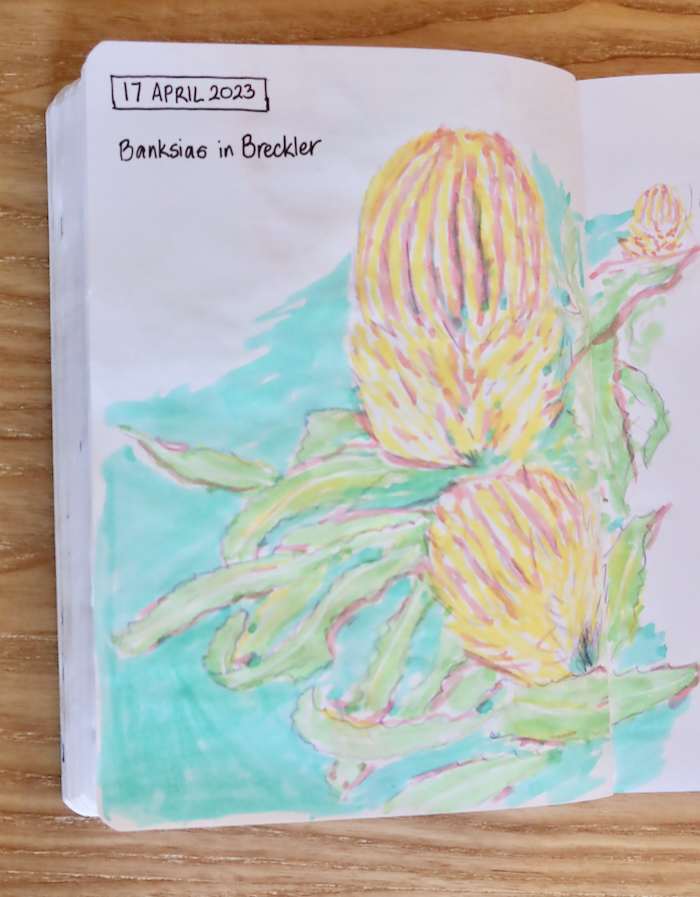
- Sketchbook pages, doing some more exploring with watercolours and highlighters.
- A Notion template for planning out my week - not sure if it will be useful for anyone else, but it's working nicely for me so I thought I'd share.
- Blind contour sketches. I have a confession: I often doodle during remote work meetings, but don't want people to feel like I'm not paying attention (keeping my hands busy actually helps me keep focus). So I've started drawing portraits from the little squares in Google Meet without looking at the paper. The results are awful and funny and completely unrecognisable.
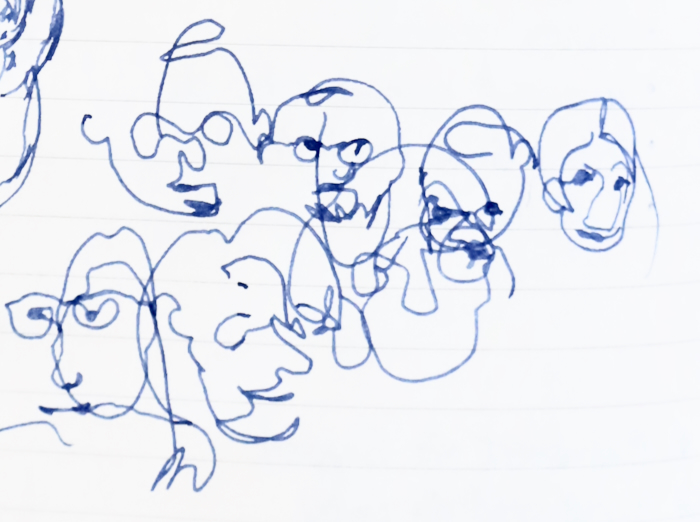
I've been consuming
- Letter of Recommdendation: Blind Contour Drawing Looking more into the drawing exercise led me to this gem:
Our brains are designed to simplify — to reduce the tumult of the world into order. Blind drawing trains us to stare at the chaos, to honor it. It is an act of meditation, as much as it is an artistic practice — a gateway to pure being. It forces us to study the world as it actually is.
- Children of Time by Adrian Tchaikovsky, after listening to an interview with him on Ezra Klein's podcast. It's a sci-fi novel about an advanced civilisation built by spiders, not for the arachnaphobic.
- I bought a pair of waterproof walking shoes before camping, an expensive last-minute purchase when I realised my collection of shoes, whilst well suited to a person who only leaves their home for school dropoff and walks in nice weather, would be completely miserable in the rain. The shoes reminded me of a recent newsletter from Sasha Chapin, about buying experiences vs posessions
Shoes are supposed to offer a small but significant improvement to your life hundreds of times. They’re actually supposed to prevent the formation of memories, if they’re working properly—specifically, memories of sore feet or blisters. Conceivably, this small but significant improvement of many sunny walks could dwarf the dinner in terms of overall enjoyment, but it certainly won’t be as memorable. Thus, the happiness granted by the shoes will be less apparent to the remembering self.